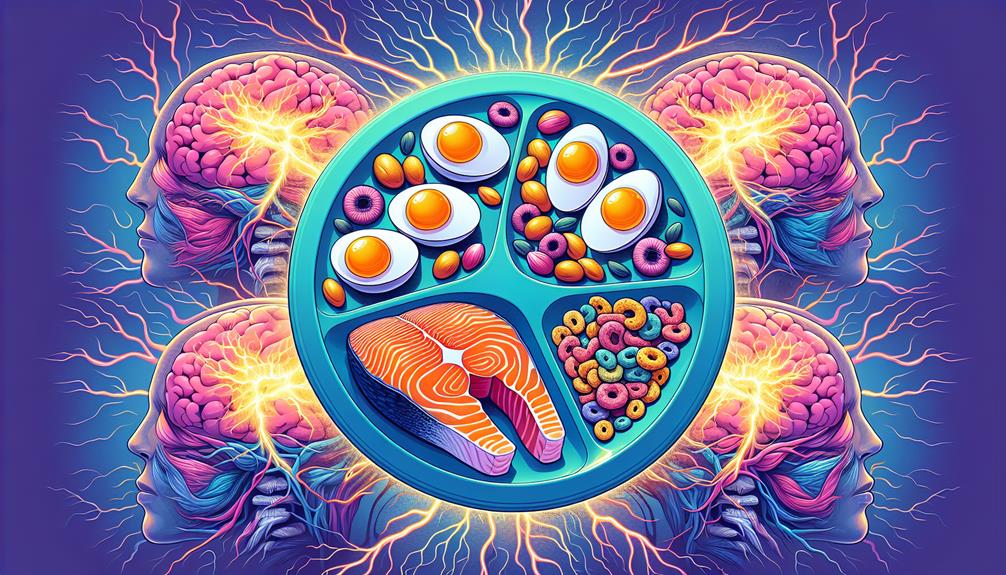







Vitamin B12 plays a vital role in supporting neurological function by assisting in myelin production, which is essential for effective nerve signal transmission. It also has a significant impact on memory retention, cognitive processes, and neurotransmitter synthesis, which can influence mood, motivation, and stress response. Insufficiency can result in nerve-related symptoms and cognitive decline, highlighting its importance for maintaining brain health. Vitamin B12 is essential for coordinating bodily functions, neural communication, and cognitive performance. Explore more about the significance of Vitamin B12 in supporting your neurological well-being and overall brain health.
Key Takeaways
- Vitamin B12 aids in myelin production for efficient nerve signal transmission.
- It supports neurotransmitter synthesis crucial for cognitive processes.
- B12 is essential for memory retention and brain health.
- Deficiency can lead to neurological symptoms like numbness and muscle weakness.
- B12 plays a fundamental role in maintaining nerve cell health and integrity.
Importance of Vitamin B12 for Neurological Function
Vitamin B12 plays a crucial role in maintaining excellent neurological function by supporting the production of myelin, a protective sheath around nerve fibers that facilitates efficient nerve signal transmission. This essential vitamin is essential for memory retention and brain health. Adequate levels of Vitamin B12 are necessary for peak nerve communication and mental clarity.
In terms of memory retention, Vitamin B12 aids in the synthesis of neurotransmitters involved in cognitive processes. It helps in forming and maintaining healthy brain cells, which are vital for memory formation and recall. Additionally, Vitamin B12 contributes to overall brain health by supporting the repair and maintenance of nerve cells.
Furthermore, Vitamin B12 is crucial for nerve communication and mental clarity. It guarantees that nerve impulses are transmitted effectively, promoting quick thinking and sharp cognitive function. Without sufficient Vitamin B12, nerve signals may be delayed or disrupted, leading to issues with focus, concentration, and overall cognitive performance. Incorporating Vitamin B12 into your diet is essential for peak neurological function.
Role of B12 in Nerve Health
Supporting peak nerve function, B12 plays a fundamental role in maintaining the health and integrity of nerve cells. Vitamin B12 benefits nerve health through its involvement in nerve regeneration processes. Nerve regeneration is essential for repairing damaged nerves, promoting ideal nerve function, and ensuring the transmission of nerve signals throughout the body. B12 aids in this process by supporting the synthesis of myelin, a protective sheath that surrounds nerve fibers and facilitates efficient signal transmission.
Moreover, B12 contributes to nerve signaling efficiency, which is necessary for proper communication between the brain and the rest of the body. By participating in the maintenance of nerve cell membranes and the production of neurotransmitters, B12 helps enhance nerve signaling speed and accuracy. This efficient signaling is crucial for coordinating various bodily functions, including movement, sensation, and cognition.
B12 and Neurotransmitter Production

Playing an essential role in neurological function, B12 influences the production of neurotransmitters necessary for efficient nerve signaling. Neurotransmitter regulation is important for proper brain function, as these chemical messengers transmit signals across synapses in the nervous system. Vitamin B12 plays a significant role in this process by supporting the synthesis of neurotransmitters such as serotonin, dopamine, and norepinephrine.
Serotonin, known for its role in mood regulation, is synthesized from the amino acid tryptophan with the help of B12. Dopamine, important for motivation and reward processing, also requires B12 for its production. Additionally, norepinephrine, involved in the body's stress response, is synthesized more effectively in the presence of adequate B12 levels.
B12 Deficiency and Neurological Impacts
Due to a deficiency in B12, significant neurological impacts can arise, affecting various aspects of nerve function and signaling. B12 deficiency consequences can lead to neurological symptoms that range from mild to severe. Neurological symptoms may include tingling or numbness in the hands and feet, difficulty maintaining balance, muscle weakness, and even changes in vision. These symptoms result from B12's essential role in maintaining the myelin sheath that covers and protects nerves, as well as its involvement in neurotransmitter synthesis important for proper nerve signaling.
In cases of prolonged B12 deficiency, more severe neurological impacts can occur. These may manifest as memory loss, cognitive decline, and even nerve damage. The neurological consequences of B12 deficiency underscore the significant role this vitamin plays in supporting nerve function and overall neurological health. Early detection and treatment of B12 deficiency are critical to prevent long-term neurological damage and to alleviate the associated symptoms. If you experience any of these neurological symptoms, consulting a healthcare professional for proper evaluation and management is necessary.
B12s Influence on Cognitive Function

In exploring the impact of B12 on neurological functions, it is essential to ponder its influence on cognitive function as well. Vitamin B12 plays a pivotal role in cognitive enhancement by supporting memory retention and focus enhancement. Adequate levels of B12 are essential for ideal brain development and function, which directly impacts cognitive abilities.
Memory retention is a key area where B12's influence on cognitive function shines. B12 helps in the production of neurotransmitters that are involved in memory formation and retrieval. Furthermore, B12 deficiency has been linked to cognitive decline and memory problems, emphasizing its significance in maintaining cognitive abilities.
Additionally, focus enhancement is another aspect where B12 proves its importance. B12 aids in the synthesis of myelin, the protective sheath around nerves, which is crucial for efficient neural communication. This, in turn, enhances focus and concentration, allowing for better cognitive performance.
B12s Role in Myelin Synthesis
B12 actively participates in the synthesis of myelin, the protective sheath surrounding nerves, essential for efficient neural communication. Myelin maintenance is critical for the proper functioning of the nervous system as it acts as insulation, allowing for rapid and precise transmission of nerve impulses. This protective layer is formed by specialized cells called oligodendrocytes in the central nervous system and Schwann cells in the peripheral nervous system.
By supporting myelin synthesis, vitamin B12 plays an important role in axon protection. Axons are like the electrical wires of the nervous system, responsible for transmitting signals between neurons. Without adequate myelin, these axons are vulnerable to damage and signal distortion, leading to impaired neural communication.
Ensuring sufficient levels of vitamin B12 is essential for the production and maintenance of myelin. A deficiency in B12 can result in demyelination, where the myelin sheath deteriorates, causing disruptions in nerve signaling. Incorporating B12-rich foods or supplements in your diet is crucial for supporting myelin synthesis and overall neurological health.
B12 and Neurological Disorders

Supporting the health of your nervous system, vitamin B12 is intricately linked to various neurological disorders through its role in maintaining myelin integrity and nerve function. In Parkinson's disease, studies suggest that low levels of B12 may contribute to cognitive decline, a common symptom in advanced stages of the disease. Research has shown that individuals with Parkinson's tend to have lower B12 levels compared to healthy individuals, highlighting the importance of adequate B12 intake in this population. Additionally, in multiple sclerosis, a condition characterized by nerve damage due to demyelination, B12 has been investigated for its potential neuroprotective effects. Some studies suggest that B12 supplementation could have a positive impact on nerve function and possibly slow down the progression of the disease. Understanding the role of B12 in these neurological disorders sheds light on the potential therapeutic implications of vitamin B12 supplementation in managing cognitive decline in Parkinson's disease and promoting nerve health in multiple sclerosis.
B12 Supplementation for Brain Health
Consider incorporating vitamin B12 supplementation into your brain health regimen to support peak neurological function and cognitive well-being. Vitamin B12 plays a vital role in brain development and function. Adequate levels of B12 support the production of myelin, a protective sheath around nerves that enhances signal transmission in the brain. By ensuring ideal myelin formation, B12 promotes efficient cognitive processes and overall brain health.
Supplementation with vitamin B12 has been linked to cognitive enhancement, particularly in older adults who may be at risk of deficiency due to age-related absorption issues. Studies suggest that maintaining sufficient B12 levels through supplementation can help preserve memory, reasoning skills, and overall cognitive function as you age.
Incorporating B12 into your brain health routine can contribute to improved neurological performance and may help prevent cognitive decline. Whether through dietary sources or supplements, ensuring adequate B12 intake is a proactive step towards supporting your brain's health and cognitive capabilities.
Recommended B12 Intake for Neurological Support

Improving neurological function through ideal intake of vitamin B12 is essential for preserving cognitive health and overall brain well-being. Adequate B12 levels play a critical role in supporting neurological development and maintaining peak cognitive performance. The recommended daily intake of vitamin B12 for adults is 2.4 micrograms. However, individuals over 50 may benefit from higher levels due to potential absorption issues.
For those following a vegetarian or vegan diet, it is important to guarantee sufficient B12 intake through fortified foods or supplements since plant-based sources do not naturally contain this vitamin. Monitoring B12 levels through blood tests can help determine if supplementation is necessary to support neurological health.
Incorporating B12-rich foods like meat, fish, dairy products, and fortified cereals into your diet can help meet the recommended intake. Remember, maintaining adequate B12 levels is crucial for neurological support, so consult with a healthcare provider to determine the best approach for your individual needs.






